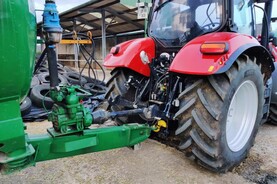The Government’s position on the delivery of financial aid to farmers affected by increased fertiliser costs must be clarified, as it is two months since Minister for Agriculture Charlie McConalogue indicated that such moves were under consideration, according to the Irish Creamery Milk Suppliers’ Association (ICMSA).
ICMSA president Pat McCormack stated that clarification must be given on whether or not a fertiliser support package similar to the €836m scheme approved for Polish farmers will be made available for Irish farmers.
He asked if any plan had been submitted to the European Commission for approval.
“Or is the plan, as we suspect, to just sit around and let the farmers take the hit for a four-fold increase in fertiliser prices while all our State energy goes into imposing more regulatory burdens and environmental restrictions on the same group of farmers?” he questioned.
Warnings
McCormack went on to outline the possibility of a forage shortage at the back end of next winter should farmers reduce their fodder yields, adding that the importance of grass crops cannot be underappreciated.
“It’s time for some facts – facts that are already established and obvious and facts that are already identifiable, but which are yet to emerge,” he said.
“We are already hearing warnings that we could be looking at a fodder crisis next spring. I’m not sure that non-farmers completely appreciate the truth of the observation that Ireland’s most important crop is grass: both our multi-billion dairy and beef sectors depend on that.
“If we don’t have silage, then we are in serious trouble in both of those. And we’re back here to the old mistake where we could introduce a subsidy now that would address, in some way, the exorbitant cost of fertiliser, but the Government seems unwilling to do that,” said McCormack.
Commitments
The end result of failing to introduce forage-growing support schemes would be the subsidising of forage next year, which could be avoided, the ICMSA president continued.
“That in turn will lead to a fodder shortage next spring, at which time the Government will have to introduce a fodder subsidy that could have been avoided if they had subsidised the fertiliser that would have given the farmers the silage.
“I appeal again to the Minister to make good on the commitments he seemed to be giving us two months ago to introduce measures that will help with the rocketing costs of fertilisers.
“Not alone is it the right thing to do, but I predict it will end up saving exchequer funding by staving off a more expensive fodder issue next spring,” he concluded.






 This is a subscriber-only article
This is a subscriber-only article











SHARING OPTIONS: